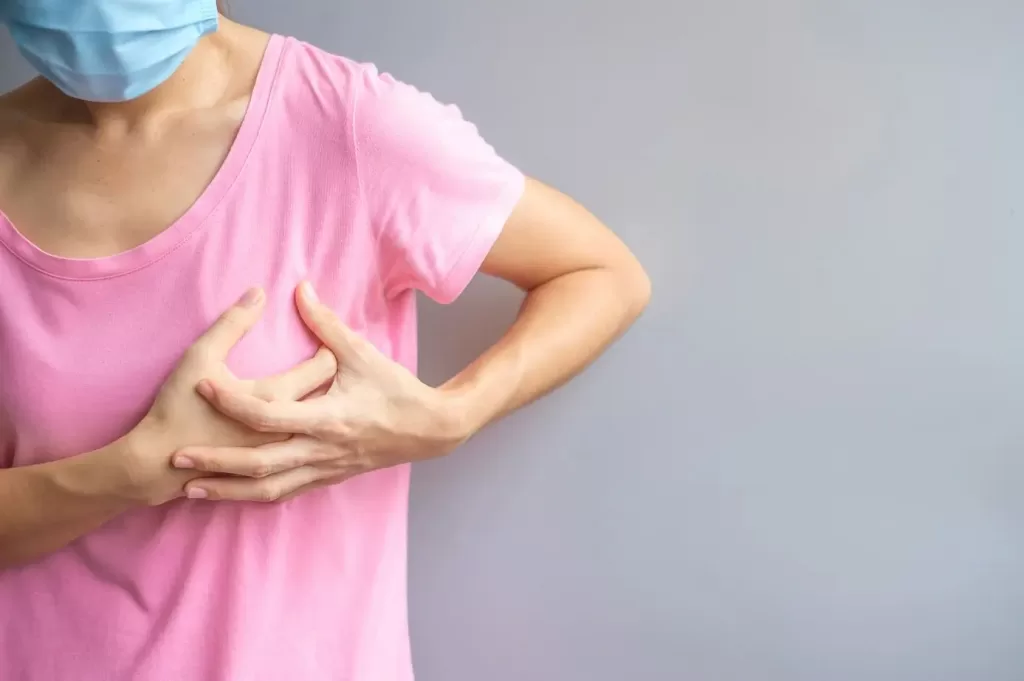The causes of breast pain
Medically Reviewed by Dr Aifric Boylan
Last updated on 11.06.2024
Breast pain refers to any area or areas of tenderness, discomfort or pain in one or both breasts. It can occur for a variety of reasons.
Is breast pain a sign of breast cancer?
Breast pain is more commonly due to reasons OTHER than cancer. However breast pain can occur with some types of cancer, so all breast symptoms should be assessed by a doctor.
What are the most common causes of breast pain?
Hormonal causes
- Associated with the menstrual cycle – some women may notice breast pain during their period, or prior to it as part of the Pre-Menstrual Syndrome (PMS). This type of breast pain is usually cyclical, that is, it occurs periodically at certain times of the month associated with your cycle and can be absent the rest of the time.
- Pregnancy – particularly in the first trimester the high progesterone levels often result in tender breasts and nipples
- Perimenopause – painful breasts can result from the hormonal fluctuations that occur as menopause approaches
- Side effect of Menopausal Hormone Therapy, or MHT (traditionally called HRT) – sore breasts can occur when a post-menopausal women commences on oestrogen therapy
- Fibrocystic breast tissue – some women have lumpy breast tissue made up of small, fluid-filled cysts, which become tender at different times throughout the menstrual cycle. Is it not dangerous, and is not connected to breast cancer
Simple Breast Cysts
These are fluid-filled lumps within the breasts which may be tender. They are not cancerous. A scan can help determine if a lump is a simple cyst.
Injury or scarring
Injury or scarring to the breast, including previous surgery, may cause breast pain. Muscular strain to areas around the breast, eg. chest wall, pectorals, or rib muscles, can be “referred”, or felt as breast pain. A poorly fitting or insufficiently supportive bra may also cause pain or discomfort in the breasts.
Infection
- Mastitis is an infection of breast tissue which can occur during breastfeeding, and often causes a tender, firm, red area of the breast and fevers
- Breast abscess – this is a localized collection of pus in the breast
Breast cancer
Whilst not a common symptom of Breast Cancer, breast pain can sometimes occur- for this reason, any woman who experiences breast pain should arrange an assessment with a doctor without delay.
What should I do for breast pain?
- Try and take note of when it is occurring and if there is any pattern associated with it, eg. a particular time of the month, as this information will be useful for your doctor
- See your doctor for an assessment of your breast pain, which will involve being asked some questions, and if appropriate a breast examination. Based on the findings of the assessment your doctor will advise whether other tests such as scans are necessary
- Ensure you are wearing a well-fitting, supportive bra, and similarly ensure you exercise with good bra support.
Treatment for hormonal breast pain related to your period/PMS:
- you can try natural measures such as eating healthily, drinking 2L water daily, and reducing your caffeine intake as this has been shown to help some people.
- general measures to reduce stress may also help, such as relaxation/meditation and regular exercise
- whilst there is no concrete evidence on how effective it is, some people find Evening Primrose Oil helps their menstrual breast pain (do not take if you have history of seizures). Check with your doctor if this is something you should try.
When should I see a doctor about breast pain?
- Any new or persistent breast pain
- Nipple discharge – clear, coloured, or bloody liquid coming from the nipple
- A new lump in the breast or underarm region
- Breast redness, swelling, or localized firmness
- New rash on the breast skin, nipple or any unusual skin changes.
If you have any of the above symptoms please see your doctor as soon as possible
Article Resources
https://www.thewomens.org.au/health-information/breast-health/breast-soreness#
Getting a Mental Health Care Plan in Australia: Your Guide
Getting a Mental Health Care Plan in Australia: Your Guide Mental health matters—and if you’re feeling overwhelmed, anxious, or down, a mental health care plan can help. But what is it, and how do [...]
UTI Symptoms and Treatment: What You Need to Know
UTI Symptoms and Treatment: What You Need to Know Urinary Tract Infections (UTIs) are common, uncomfortable, and often disruptive. But what exactly are the signs to watch for, and how can you get relief [...]
Free Mental Health Care Plan Online | Bulk-Billed by Qoctor
Free Mental Health Care Plan Online | Bulk-Billed by Qoctor Discover how to get a free, bulk-billed Mental Health Care Plan (MHCP) in Australia through Qoctor's telehealth service. Accessing [...]




